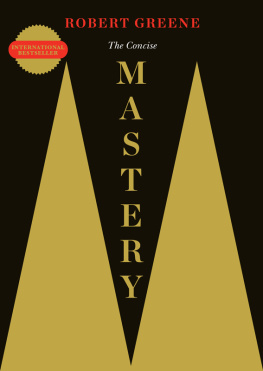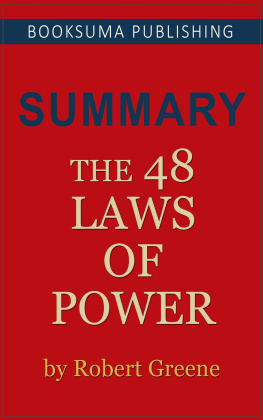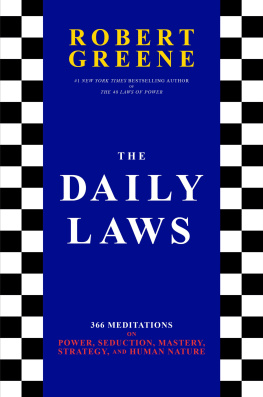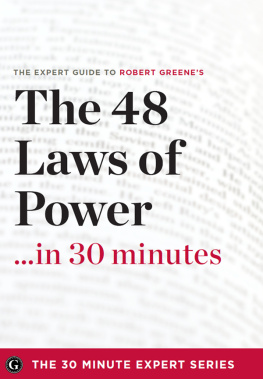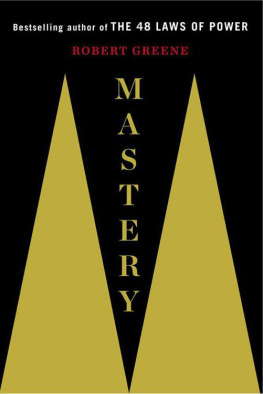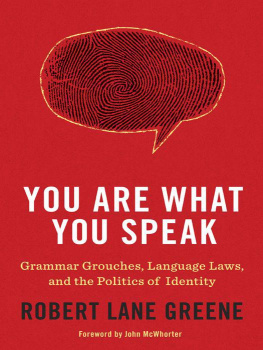Penguin supports copyright. Copyright fuels creativity, encourages diverse voices, promotes free speech, and creates a vibrant culture. Thank you for buying an authorized edition of this book and for complying with copyright laws by not reproducing, scanning, or distributing any part of it in any form without permission. You are supporting writers and allowing Penguin to continue to publish books for every reader.
Introduction
If you come across any special trait of meanness or stupidity... you must be careful not to let it annoy or distress you, but to look upon it merely as an addition to your knowledgea new fact to be considered in studying the character of humanity. Your attitude towards it will be that of the mineralogist who stumbles upon a very characteristic specimen of a mineral.
Arthur Schopenhauer
Throughout the course of our lives, we inevitably have to deal with a variety of individuals who stir up trouble and make our lives difficult and unpleasant. Some of these individuals are leaders or bosses, some are colleagues, and some are friends. They can be aggressive or passive-aggressive, but they are generally masters at playing on our emotions. They often appear charming and refreshingly confident, brimming with ideas and enthusiasm, and we fall under their spell. Only when it is too late do we discover that their confidence is irrational and their ideas ill-conceived. Among colleagues, they can be those who sabotage our work or careers out of secret envy, excited to bring us down. Or they could be colleagues or hires who reveal, to our dismay, that they are completely out for themselves, using us as stepping-stones.
What inevitably happens in these situations is that we are caught off guard, not expecting such behavior. Often these types will hit us with elaborate cover stories to justify their actions, or blame handy scapegoats. They know how to confuse us and draw us into a drama they control. We might protest or become angry, but in the end we feel rather helplessthe damage is done. Then another such type enters our life, and the same story repeats itself.
We often notice a similar sensation of confusion and helplessness when it comes to ourselves and our own behavior. For instance, we suddenly say something that offends our boss or colleague or friendwe are not quite sure where it came from, but we are frustrated to find that some anger and tension from within has leaked out in a way that we regret. Or perhaps we enthusiastically throw our weight into some project or scheme, only to realize it was quite foolish and a terrible waste of time. Or perhaps we fall in love with a person who is precisely the wrong type for us and we know it, but we cannot help ourselves. What has come over us, we wonder?
In these situations, we catch ourselves falling into self-destructive patterns of behavior that we cannot seem to control. It is as if we harbor a stranger within us, a little demon who operates independently of our willpower and pushes us into doing the wrong things. And this stranger within us is rather weird, or at least weirder than how we imagine ourselves.
What we can say about these two thingspeoples ugly actions and our own occasionally surprising behavioris that we usually have no clue as to what causes them. We might latch onto some simple explanations: That person is evil, a sociopath or Something came over me; I wasnt myself. But such pat descriptions do not lead to any understanding or prevent the same patterns from recurring. The truth is that we humans live on the surface, reacting emotionally to what people say and do. We form opinions of others and ourselves that are rather simplified. We settle for the easiest and most convenient story to tell ourselves.
What if, however, we could dive below the surface and see deep within, getting closer to the actual roots of what causes human behavior? What if we could understand why some people turn envious and try to sabotage our work, or why their misplaced confidence causes them to imagine themselves as godlike and infallible? What if we could truly fathom why people suddenly behave irrationally and reveal a much darker side to their character, or why they are always ready to provide a rationalization for their behavior, or why we continually turn to leaders who appeal to the worst in us? What if we could look deep inside and judge peoples character, avoiding the bad hires and personal relationships that cause us so much emotional damage?
If we really understood the roots of human behavior, it would be much harder for the more destructive types to continually get away with their actions. We would not be so easily charmed and misled. We would be able to anticipate their nasty and manipulative maneuvers and see through their cover stories. We would not allow ourselves to get dragged into their dramas, knowing in advance that our interest is what they depend on for their control. We would finally rob them of their power through our ability to look into the depths of their character.
Similarly, with ourselves, what if we could look within and see the source of our more troubling emotions and why they drive our behavior, often against our own wishes? What if we could understand why we are so compelled to desire what other people have, or to identify so strongly with a group that we feel contempt for those who are on the outside? What if we could find out what causes us to lie about who we are, or to inadvertently push people away?
Being able to understand more clearly that stranger within us would help us to realize that it is not a stranger at all but very much a part of ourselves, and that we are far more mysterious, complex, and interesting than we had imagined. And with that awareness we would be able to break the negative patterns in our lives, stop making excuses for ourselves, and gain better control of what we do and what happens to us.
Having such clarity about ourselves and others could change the course of our lives in so many ways, but first we must clear up a common misconception: we tend to think of our behavior as largely conscious and willed. To imagine that we are not always in control of what we do is a frightening thought, but in fact it is the reality. We are subject to forces from deep within us that drive our behavior and that operate below the level of our awareness. We see the resultsour thoughts, moods, and actionsbut have little conscious access to what actually moves our emotions and compels us to behave in certain ways.
Look at our anger, for instance. We usually identify an individual or a group as the cause of this emotion. But if we were honest and dug down deeper, we would see that what often triggers our anger or frustration has deeper roots. It could be something in our childhood or some particular set of circumstances that triggers the emotion. We can discern distinct patterns if we lookwhen this or that happens, we get angry. But in the moment that we feel anger, we are not reflective or rationalwe merely ride the emotion and point fingers. We could say something similar about a whole slew of emotions that we feelspecific types of events trigger sudden confidence, or insecurity, or anxiety, or attraction to a particular person, or hunger for attention.






